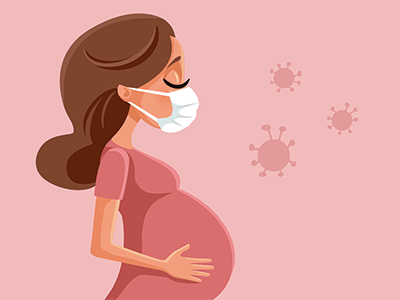
About Pregnancy during Coronavirus(Covid-19)-What are the Risks?
If you’re pregnant, current evidence suggests that the risk of coronavirus (COVID-19) to you and your baby is very small.
But we’re still learning about coronavirus (COVID-19). Pregnant women are considered at-risk groups until there’s more evidence about how it affects them and their babies.
One of the best ways to care for your baby during the coronavirus (COVID-19) pandemic is to keep looking after yourself and keep try below things:
- Rest, eat healthy food and get some physical activity
- Stay connected with others via phones
- Maintain good handwashing and hygiene
- Follow physical distancing guidelines
- Keep up with your antenatal appointments.
There might be changes to your antenatal appointments and tests during the coronavirus (COVID-19) pandemic. Talk to your midwife or doctor to find out how your antenatal appointment schedule is affected.
Symptoms of coronavirus (COVID-19)

Coronavirus (COVID-19) can make you sick with cold and flu-like symptoms. Common symptoms include:
- Symptoms like those of a cold or flu, including runny nose, sneezing, sore throat, cough, aches and pains
- Fever
- Difficulty breathing
- Fatigue.
Symptoms might come on very quickly and might last 2-5 days. Recovery from symptoms like tiredness might take several weeks, depending on how severe the illness has been.
Symptoms of coronavirus (COVID-19) can vary among pregnant women. Some women might not get any symptoms at all. Most women who get COVID-19 will probably have only mild or moderate symptoms.
The incubation period for coronavirus (COVID-19) can be 1-14 days. This means the virus can infect people up to 14 days before symptoms start to appear.
What to do if you’re pregnant and have symptoms of coronavirus (COVID-19)
If you’re pregnant and you have the symptoms above or you’re concerned that you might have been exposed to coronavirus (COVID-19), phone your midwife, obstetrician or General Practitioner (GP) immediately.
You’ll need special attention, and your health professional will tell you what to do next. Make sure to follow the advice you’re given.
Treatment and management of coronavirus (COVID-19) for pregnant women
There’s currently no specific treatment for coronavirus (COVID-19) that can make it go away more quickly.
If you’re pregnant and diagnosed with coronavirus (COVID-19), your doctor or another health professional will let you know how to manage the symptoms. This might include paracetamol and lots of fluids and rest.
Your health professional will also tell you how to protect others from infection. This might include a period of isolation until your symptoms go away. This period might be 1-2 weeks. Your health professional will give you advice about how to handle isolation within your family.
Birth and coronavirus (COVID-19) for pregnant women
If you’ve been diagnosed with coronavirus (COVID-19) and are due to give birth, your midwife or doctor will talk with you about what will be safest for you and your baby.
There’s a risk that your newborn will catch coronavirus (COVID-19) from you after birth. Health professionals will watch your baby closely during and after birth for any signs of infection.
Professionals will also advise you on how to reduce your newborn’s risk of catching coronavirus (COVID-19). This might include careful handwashing and personal hygiene precautions when you’re handling your newborn, as well as extra measures like limiting visitors.
Reducing your risk of catching coronavirus (COVID-19) during pregnancy
If you’re pregnant, it’s important to be very careful about reducing your risk of catching coronavirus (COVID-19). Good personal hygiene can help to protect you from coronavirus (COVID-19) and prevent its spread.
Here’s how you can do this:
- Wash your hands carefully and regularly. Use soap and water for at least 20 seconds. You can use hand sanitiser if you don’t have soap and water.
- Wash your hands after going to the toilet, before touching food, after being out in public, after being around sick people, and after coughing, sneezing or blowing your nose.
- Cover your nose and mouth with a tissue when coughing or sneezing, or cough or sneeze into your elbow. If you’ve used a tissue, put it into a bin afterwards.
- Avoid touching your eyes, nose and mouth.
- Where possible, stay at least 1.5-2 m away from anyone who’s sneezing or coughing, and avoid close contact with anyone with coronavirus (COVID-19).
- Remove germs that might have come into your house by cleaning frequently touched surfaces and objects daily using a regular household detergent and water. This includes tables, benchtops, light switches, doorknobs and cupboard handles.
- Avoid smoking, and stay away from cigarette smoke. If you or your partner smoke, now is a great time to quit.
- Avoid overseas travel.
Flu immunisation and coronavirus (COVID-19)
All pregnant women should have the flu immunisation when the flu vaccine becomes available.
Flu immunisation won’t protect you against coronavirus (COVID-19). But it will protect you from influenza, which is bad for pregnant women and their babies.
If you have the flu immunisation, this can also help health professionals rule out flu if you have flu-like symptoms. And if fewer people get the flu, it can also help reduce the demand on the health care system.
If you are facing any symptoms like these then please reach out to your doctor and for more information kindly visit our website.
